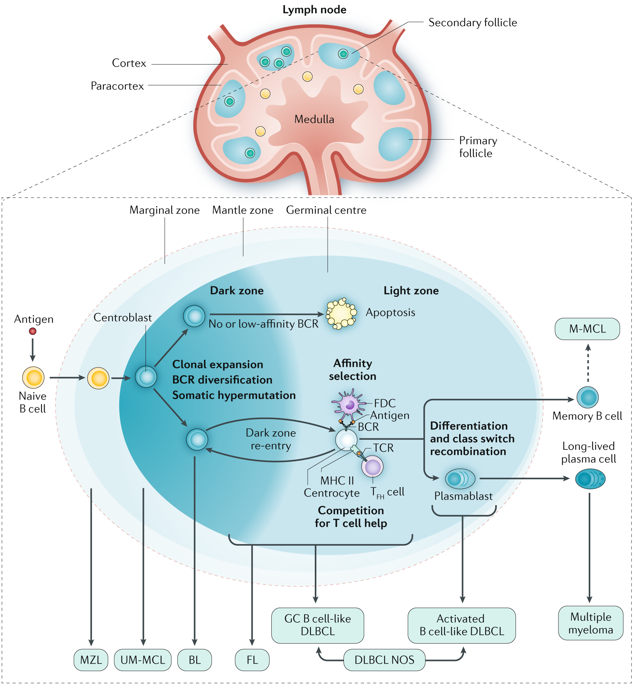当前位置:
X-MOL 学术
›
Nat. Rev. Dis. Primers
›
论文详情
Our official English website, www.x-mol.net, welcomes your
feedback! (Note: you will need to create a separate account there.)
Follicular lymphoma.
Nature Reviews Disease Primers ( IF 76.9 ) Pub Date : 2019-12-12 , DOI: 10.1038/s41572-019-0132-x Antonino Carbone 1 , Sandrine Roulland 2 , Annunziata Gloghini 3 , Anas Younes 4 , Gottfried von Keudell 4 , Armando López-Guillermo 5 , Jude Fitzgibbon 6
Nature Reviews Disease Primers ( IF 76.9 ) Pub Date : 2019-12-12 , DOI: 10.1038/s41572-019-0132-x Antonino Carbone 1 , Sandrine Roulland 2 , Annunziata Gloghini 3 , Anas Younes 4 , Gottfried von Keudell 4 , Armando López-Guillermo 5 , Jude Fitzgibbon 6
Affiliation

|
Follicular lymphoma (FL) is a systemic neoplasm of the lymphoid tissue displaying germinal centre (GC) B cell differentiation. FL represents ~5% of all haematological neoplasms and ~20-25% of all new non-Hodgkin lymphoma diagnoses in western countries. Tumorigenesis starts in precursor B cells and becomes full-blown tumour when the cells reach the GC maturation step. FL is preceded by an asymptomatic preclinical phase in which premalignant B cells carrying a t(14;18) chromosomal translocation accumulate additional genetic alterations, although not all of these cells progress to the tumour phase. FL is an indolent lymphoma with largely favourable outcomes, although a fraction of patients is at risk of disease progression and adverse outcomes. Outcomes for FL in the rituximab era are encouraging, with ~80% of patients having an overall survival of >10 years. Patients with relapsed FL have a wide range of treatment options, including several chemoimmunotherapy regimens, phosphoinositide 3-kinase inhibitors, and lenalidomide plus rituximab. Promising new treatment approaches include epigenetic therapeutics and immune approaches such as chimeric antigen receptor T cell therapy. The identification of patients at high risk who require alternative therapies to the current standard of care is a growing need that will help direct clinical trial research. This Primer discusses the epidemiology of FL, its molecular and cellular pathogenesis and its diagnosis, classification and treatment.
中文翻译:

滤泡性淋巴瘤。
滤泡性淋巴瘤 (FL) 是淋巴组织的系统性肿瘤,表现出生发中心 (GC) B 细胞分化。在西方国家,FL 约占所有血液肿瘤的 5%,约占所有新诊断的非霍奇金淋巴瘤的 20-25%。肿瘤发生始于前体 B 细胞,并在细胞达到 GC 成熟步骤时变成成熟的肿瘤。 FL 之前是无症状的临床前阶段,其中携带 at(14;18) 染色体易位的癌前 B 细胞积累了额外的遗传改变,尽管并非所有这些细胞都进展到肿瘤阶段。 FL 是一种惰性淋巴瘤,尽管一小部分患者面临疾病进展和不良结果的风险,但其预后基本上良好。利妥昔单抗时代的 FL 治疗结果令人鼓舞,约 80% 的患者总生存期 > 10 年。复发性 FL 患者有多种治疗选择,包括多种化学免疫治疗方案、磷酸肌醇 3-激酶抑制剂以及来那度胺联合利妥昔单抗。有前途的新治疗方法包括表观遗传疗法和免疫方法,例如嵌合抗原受体 T 细胞疗法。识别需要当前护理标准的替代疗法的高危患者的需求日益增长,这将有助于指导临床试验研究。本入门讨论了 FL 的流行病学、其分子和细胞发病机制及其诊断、分类和治疗。
更新日期:2019-12-12
中文翻译:

滤泡性淋巴瘤。
滤泡性淋巴瘤 (FL) 是淋巴组织的系统性肿瘤,表现出生发中心 (GC) B 细胞分化。在西方国家,FL 约占所有血液肿瘤的 5%,约占所有新诊断的非霍奇金淋巴瘤的 20-25%。肿瘤发生始于前体 B 细胞,并在细胞达到 GC 成熟步骤时变成成熟的肿瘤。 FL 之前是无症状的临床前阶段,其中携带 at(14;18) 染色体易位的癌前 B 细胞积累了额外的遗传改变,尽管并非所有这些细胞都进展到肿瘤阶段。 FL 是一种惰性淋巴瘤,尽管一小部分患者面临疾病进展和不良结果的风险,但其预后基本上良好。利妥昔单抗时代的 FL 治疗结果令人鼓舞,约 80% 的患者总生存期 > 10 年。复发性 FL 患者有多种治疗选择,包括多种化学免疫治疗方案、磷酸肌醇 3-激酶抑制剂以及来那度胺联合利妥昔单抗。有前途的新治疗方法包括表观遗传疗法和免疫方法,例如嵌合抗原受体 T 细胞疗法。识别需要当前护理标准的替代疗法的高危患者的需求日益增长,这将有助于指导临床试验研究。本入门讨论了 FL 的流行病学、其分子和细胞发病机制及其诊断、分类和治疗。











































 京公网安备 11010802027423号
京公网安备 11010802027423号